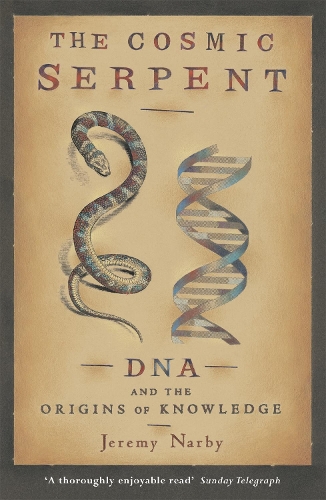
The Cosmic Serpent
(Paperback)
Publishing Details
The Cosmic Serpent
By (Author) Jeremy Narby
Orion Publishing Co
Weidenfeld & Nicolson
1st February 2000
7th October 1999
United Kingdom
Classifications
General
Non Fiction
Genetics (non-medical)
Computational biology / bioinformatics
Psychology: states of consciousness
572.86
Physical Properties
Paperback
272
Width 130mm, Height 196mm, Spine 22mm
240g
Description
A gripping investigation that opens fresh perspectives on biology and anthropology
'At the cutting edge of contemporary thought' GUARDIAN
'A thoroughly enjoyable read' SUNDAY TELEGRAPH
While living among Peruvian Indians, anthropologist Jeremy Narby became intrigued by their claim that their phenomenal knowledge of plants and biochemistry was communicated to them directly while under the influence of hallucinogens.
Despite his initial scepticism, Narby found himself engaged in an increasingly obsessive personal quest. The evidence he collected - on subjects as diverse as molecular biology, shamanism, neurology and ancient mythology - led inexorably to the conclusion that the Indians' claims were literally true: to a consciousness prepared with drugs, specific biochemical knowledge could indeed be directly transmitted through DNA itself.
A gripping investigation that opens fresh perspectives on biology, anthropology and the limits of rationalism, The Cosmic Serpent is new science of the most exhilarating kind.
Reviews
Books such as Narby's are at the cutting edge of contemporary thought . . . [The Cosmic Serpent] ought to be something of an intellectual cause celebre * GUARDIAN *
A thoroughly enjoyable read * SUNDAY TELEGRAPH *
Highly enjoyable, convincing and well illustrated * TLS *
A Copernican revolution for the life sciences * MEDICAL TRIBUNE *
An intriguing detective story, wondrous visions and a wealth of fascinating information on genetic science, shamanism, etc., and he also offers some valuable thoughts on the parochial smallness of official science, but, overall, his book's greatest value, perhaps, is as a case study in the excesses of scholarship gone astray * PUBLISHERS WEEKLY *
Author Bio
Jeremy Narby studied history at the University of Canterbury and received a PhD in anthropology from Stanford University. For two years he lived with the Ashaninca Indians in the Peruvian Amazon, studying their methods of using the rainforest's resources. He lives in Switzerland with his wife and children.
